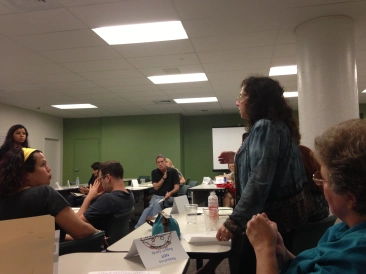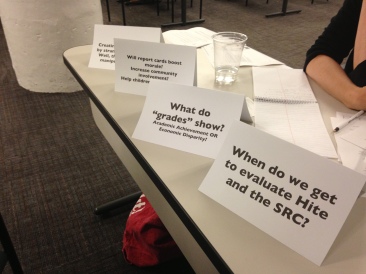 Like many Philadelphia public school parents, I received an email from the district two weeks ago inviting me to weigh in on a new “school report card.” This report card was billed as a tool to give parents more information to help us make better choices about our schools. However, the school report card is the latest scheme in a series of efforts to grade public schools for questionable purposes. In Philadelphia, we’ve had AYP, School Annual Reports, and a school performance index (redone as recently as spring 2011). Interestingly enough, the Philadelphia School Partnership, a privately funded group, made up its own report card for schools last year, which was decried for its shady reliance on minimal data.
Like many Philadelphia public school parents, I received an email from the district two weeks ago inviting me to weigh in on a new “school report card.” This report card was billed as a tool to give parents more information to help us make better choices about our schools. However, the school report card is the latest scheme in a series of efforts to grade public schools for questionable purposes. In Philadelphia, we’ve had AYP, School Annual Reports, and a school performance index (redone as recently as spring 2011). Interestingly enough, the Philadelphia School Partnership, a privately funded group, made up its own report card for schools last year, which was decried for its shady reliance on minimal data.
The idea for a new graded school report card didn’t come from parents. It’s not surprising that every parent I spoke with after receiving that email responded with distrust and indignation. We’ve been around this block before. We’ve watched the district roll out assessment after assessment. Frankly, none of it ever represented what is noteworthy or admirable—or weak or lacking—in our children’s schools. Very few changes came as a result except for school closings and charter conversion. And none of it compares with the best ways parents have of assessing their children’s schools, which are primarily from walking in the door and meeting with the principal and teachers, observing a classroom or the lunchroom, and watching your child’s engagement with or alienation from school.
Here’s What Else Is Wrong:
- The concept of assigning a “grade” to all schools in the absence of basic, never mind decent, funding and resources is outrageous. We don’t have guidance counselors or school aides but the District wants to judge us on school climate? How can you lay off teachers and classroom aides and push class sizes to the contractual maximum, and then turn around and grade a school on its academic program?
- A single grade, such as an A-to-F grade currently being used in a number of districts and states, not only fails to represent an entire school or the complexity of a school community; it also has the effect of simply labeling schools with a one-size-fits-all stamp. So Masterman is an “A” and another school is an “F”. Does anyone care to figure out why or what to do about it?
- We know from experience across the country, as well as in our own city, that the data used for these sorts of “tools” comes down to the same old test scores. These are data we already have, and they tell us nothing about whether a school provides a well-rounded, engaging curriculum that truly educates students.
- Finally, as we have seen in Philadelphia and across the country, the primary uses of “school report cards” are not by parents, but by districts and private interests seeking to label schools as failing, to close down neighborhood schools, and to turn them over to charters.
Inputs Versus Outputs?
If you asked any parent what the most pressing issue is for schools, I doubt you’d find anyone who would pinpoint developing a rubric for grading schools as the most critical priority. Unless you’ve been living under a rock, you’d know the critical issue facing all our public schools is the fact that they have so little in the way of funding. At the vote to pass this coming year’s school budget, SRC Commissioner Dworetzky said:
“Wherever the line falls between a school and not a school, [the budget] being proposed here is very close to the line.”

Last Monday at the first of the parent meetings on the school report card, dozens of parents asked questions about what validity any “school grades” would have in the absence of resources. The meeting was led by a consulting outfit called Tembo Consulting, which is receiving over $80,000 for this project from a Dell Foundation grant. This was the response we got from one of the paid consultants for the project:
“If were a parent, I wouldn’t care about the inputs when it’s the outputs that matter.”
The entire room erupted in outrage. A factory metaphor for our children and their schools? What did he think the “inputs” we shouldn’t worry about were anyway? Actual teaching? Decent resources? Books and supplies? Was he suggesting we just drive those teachers, staff, and students until they fill in those bubbles on the tests, no matter how few supports they have?
Maybe it was the condescension of someone who is not a parent telling a roomful of parents—who are incredibly anxious about the underfunded schools their children will walk into in the fall—that the lack of resources does not matter. Whatever the reason, every parent knows resources matter. No parent would expect a child to meet the goal of physical health without providing “inputs”—say, nutritious meals, good sleep, and opportunity to exercise. Why are our schools any different?
“Pay No Attention to the Man Behind the Curtain”
 No, school report cards are not for parents or, for that matter, for students, teachers, or school communities as a whole.
No, school report cards are not for parents or, for that matter, for students, teachers, or school communities as a whole.
It’s important to understand that the impetus for this new report card came from the Gates-funded Great Schools Compact. Creating a school report card for the district was one of the primary objectives in their grant proposal to the Gates Foundation in late 2011. And it is the Compact Committee that is pushing for new “accountability” measures amidst the District’s financial ruin.
Great Schools Compact meetings are private. You and I cannot attend them, nor can we have access to the information to which they are privy. At Monday’s meeting, the consultants confirmed that they had been working with the Compact since starting the project last January and that the Accountability Working Group (a committee within the Great Schools Compact) would be briefed about the public sessions.
You’ve got to wonder about a district where private consultants and secretive bodies representing wealthy “donors” have more say over our children’s education than we do. There’s no question parents should be suspicious of the new graded report cards. This spring, the SRC closed 24 schools, forcing nearly 10,000 children to find placements in other schools now being stripped of resources and staff. It’s not rocket science to figure out that “accountability” without resources is false advertising and a recipe for failure.
As of this morning, there were five more public meetings left for parent comment. However, at the very last minute, the District cancelled today’s 11:00 a.m. meeting and all the rest of the public meetings saying it did so in response to parent concerns. A reporter told a parent that the District is no longer interested in “open-ended conversations” and will restructure the sessions to require parents to give narrow input into the school report card content.
Apparently, the SRC and the District still haven’t gotten our message: we don’t need grades to label and punish our schools. We need the resources to fix them.
Rebecca Poyourow


This comment was emailed to us from a parent at McMichael Elementary School:
“I attended the District’s meeting on Monday also. I think these meetings are a waste of time and money. The facilitators did not know what the District wanted and the District still does not have a clue and us parents and students are still getting thrown under the bus as usual. What the Districts need to focus on is how to educate the children effectively in every school all over the city. If that means taking programs that work from public or charter schools and putting them in other schools that are not working then so be it. Also, the public and charter schools need to stop competing against one another and come together with parent support. If we all go to the District and demand better for our students maybe we would get better results. After all, our tax dollars are going to both of them public and charter.
“On another note, they say they want to get the word out to the public about the meetings but have not just used the old fashioned ways of putting it in the paper and on the news. Or if they really want to get technical, put out a robo text message to all cell phones, since everyone has one. (This method is used by my son’s charter school.) Then they say their meetings were not attended and the parents do not care.
“The bottom line is, they make all kinds of excuses to cover themselves in every way and we all fall for it by getting upset and attacking one another. Then, we react and say we want better and we get a little momentum in our groups. When the dust settles, nothing is finished once again and we are right back where we started. It is just a vicious never ending cycle. In order to have an impact we (public/charter teachers, parents and students) need to stay on the District’s back year round collectively to get the results we deserve for our students. Also, our problem is looking at our individual schools and not focusing on the big picture of education. We are always reacting to what the District does and say. We need to come up with a platform for all schools and present it to the District and give them a deadline to implement them. When we have had enough of their excuses we take it to the City Hall/Council. They are the “keepers of the purse” and our tax dollars which pay for the education of our youth and our future.”
Great, comprehensive, article, Rebecca! I was looking at the statement the reporter made and was not aware that they were going “to restructure the sessions, so that parents can ” give narrow input into the school report card content.” They did not answer my e-mail or phone messages. Nor did they answer other parents. Given the uneasy feelings toward this project, by us parents, it would behoove them to scrap this project. If the reporter’s statement is how they will proceed, then I would say they are very arrogant and my patience is wearing very thin with them. This whole scenario is adding insult to injury and I am not amused.
Great article Rebecca – thank you as always for speaking out for parents and the children.
The SDP is showing disrespect to parents once again! Trying to control the situation exactly the same way they did with the prescribed questions during the Facilities Master Plan Meetings.
The SDP insults our intelligence and our right to have a say. Whose taxes pay for the schools? What about partnership with the parents and community? They are only interested in partnership with the big money entities.
The money being spent on this initiative could have been given to the SDP for needed resources for our children.
We need to organize like Chicago did. Take to the street and close the City down in all areas of our city. Our children’s education is the most important Civil Rights Issue of the day.
I say all parents should spread the word about when the meetings are occurring and fill the room. Give no input and demand that the SRC and Dr. Hite be present to listen to the parents. If they don’t comply then don’t allow school to begin in September. Take your child to school and stand outside and refuse to take them inside.
NO CHILDREN – NO SCHOOL!
TAKE BACK OUR SCHOOLS NOW!!!!!
Great analysis of what is actually going on, Rose. You are right. All parents need to stand up for their children and the time is now!
I thought this all started with TIMMS and comparing how we are doing with
Finland, Singapore, or Germany? Do any of you know how many tests are given to students in countries like Finland or Germany? I talked with some students and teachers from those countries and found out. Finish students do not take a single standardized test until 6th grade! I wonder how they evaluate their teachers? Germany limits the number of tests each semester to three for high school students. These tests include classroom tests and any type of “standardized” test, so if a teacher gives three unit tests a semester, the maximum has been reached and no “standardized” test could be given. The students and teachers said most of their work is judged by their class participation, both oral and written. They also indicated they get graphing calculators issued with their math textbooks and are expected to use them when needed including during a Test. When are we going to start to do what these successful countries do for our students?
Do you honestly think our educational problem is the curriculum and standards are not rigorous enough for our current students?Please go to your local school and talk with the teachers or read some of the students comments on facebook. If you live in an area of higher socioeconomic means, then your school is performing above average due to many factors such as parent support for learning and checking to see that their children are completing their homework or immediatley getting the help they need. Parents of students who attend “good” schools do not want endless tests that are meaningless to their childrens future and a huge waist of resources that should be used to improve the school learning environment by purchasing needed technology and up to date instructional materials. Maybe the new standards could be helpful, but teachers have a shorter, more limited amount of time to cover more curriculum than before due to earlier testing periods and more testing. Futhermore, how are students held accountable for doing their best on these tests? Is the test result used to help calculate the students grade or do they need a proficient score to earn a diploma or get accepted for college or … If the test has no student accountability component why would they even care about doing well. I would focus on preparing for my immediate class grade to improve my GPA and SAT exams or preparing for a big game or musical performance. I could use this test as a way of getting back at a teacher who is asking me to do more than I want to do because I have other interests. Are only math, science, and English teachers being judged by these tests or is there a test to judge a PE teacher or Art/Music teacher or Elective teachers? I wonder how long it will be before we find no one willing to interview for a math teaching position at a low performing school. I do not see how spending ALL this money on testing is changing anything except creating a National Curriculum and telling low performing schools that they continue to be low performing schools and they need to replace their teachers with better ones. It seems like I have been hearing this same argument for the past 50 years. Yes, I am a senior citizen who cares about real changes that will improve educational opportunities for the students who need an environment that is conducive to learning. Why are we spending money we do not have on schools that are already achieving and trying to have a one size fits all system because this is not why Americans create so many new things and come up with so many new ideas. If we are trying compete with Finland and Singapore, then we need to make serious structural systemic changes to our schools and do what they do or do not do in their schools. NO more football programs or other sports in our high schools and most electives would also have to be eliminated. I am a Finlander, but we live in a much different country in America and we have very different values. When the well-educated parents of public school children start to understand that a large part of schooling has changed from learning and developing critical thinking to preparing students to do well on a test that most people never have time to analyze and use as a resource to improve the educational experience for children, then they will either place their children in a school where real learning is the priority or they will get involved in changing our new system of schooling. I cannot call this system a system for learning because time and testing are not and should never be factors in a learning environment that promotes creativity and critical thinking (testing without student accountability). These two goals are what made America great and create jobs and they do not happen in a specific amount of time because each of us is unique and we do things at different rates. And futhermore, testing has never been shown to improve either of these factors. Critical thinking and creativity are factors that need to be encouraged and nurtured from Pre-K on. To flourish, they need a stress free environment so students can open up their thoughts and dream up new ideas. It seems ironic that many of the people who were allowed to be raised in this type of environment, open, creative, and stress free, are the same people who are now paying for and pushing for a more controlled and structured environment, but not for their own children? What about Bill Gates and Mark Zutterburg?
Thank you for reading and pray for your grandchildren’s future.